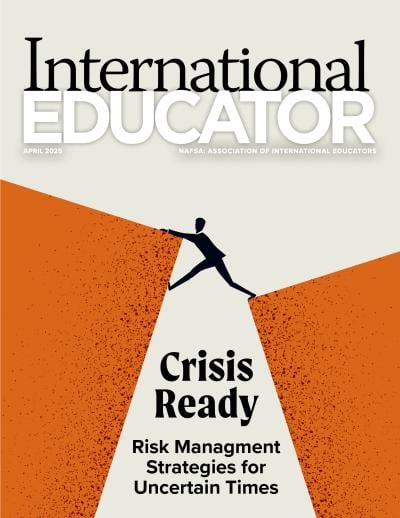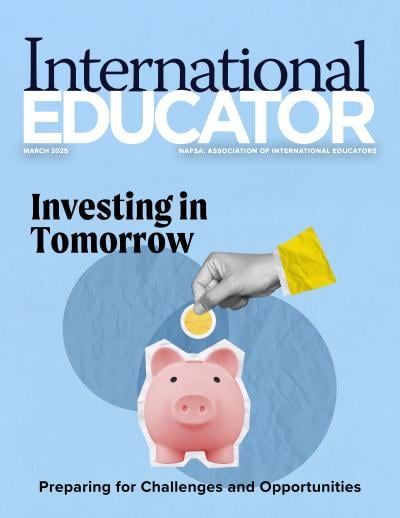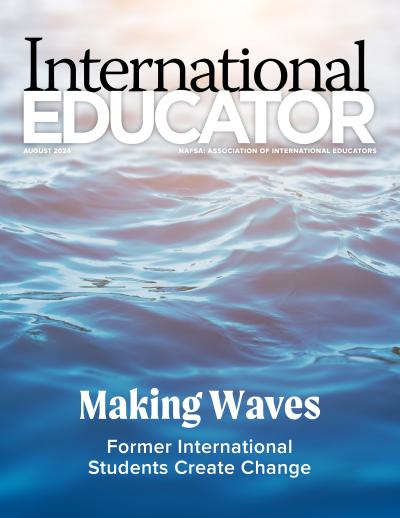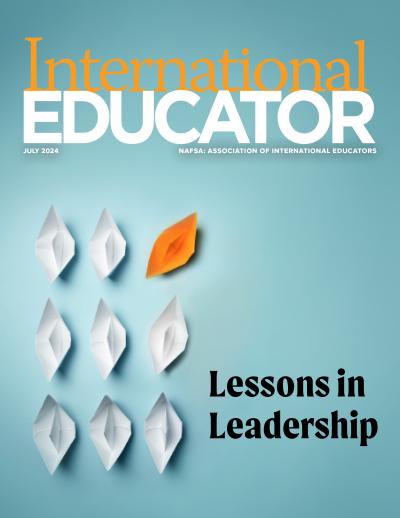Crisis and Management: Re-Centering Humanity in International Education

More than a million international students—less than 6 percent of total enrollment in U.S. higher education—have chosen to study, research, and contribute to life and learning in the United States.
International students and scholars cross oceans and borders in pursuit of knowledge, in search of opportunity, and with a belief in what America has long promised: freedom of thought, the dignity of inquiry, and the right to dream boldly.
But in a time of heightened unease—including rising nationalism, xenophobia, and immigration and visa restrictions—how we manage a crisis isn’t just about policy or process. It’s about people.
International students and scholars don’t just enrich our campuses; they help power them.
Yes, they contribute billions to our economy. But more importantly, they expand the intellectual, cultural, and social wealth of our communities. They bring languages, perspectives, courage, curiosity, and the kind of ambition that reminds us what education is really for and about.
They strengthen our laboratories, classrooms, start-ups, and public squares.
They do not drain America’s potential—they help define it.
And when they return home, they carry more than credentials. They bring with them experiences potentially shaped by democratic ideals, free expression, and a lived model of global citizenship.
In times of crisis, international students and scholars often find themselves alone and in limbo due to visa and status challenges, housing insecurity, campuses operating in siloes, or the looming threat of being cast as political pawns. These are not hypothetical issues. They are lived experiences, quietly endured by some.
It’s time to say the quiet parts loud:
- International students and scholars are not strangers to our institutions—they are integral to them.
- International students and scholars deserve dignity, safety, and due process.
- International students and scholars deserve to be seen—not as threats or transactions, but as people.
How we treat these individuals is a reflection of who we are.
And in international student and scholars, we find stories not just worth welcoming—but worth protecting.
What You Can Do Now
During this time of uncertainty, we are all looking for guidance in our work and for ways to help our students. Here are a few things we can do, some of which are covered in more depth in this issue’s feature article:
1. Center humanity in every decision.
Before focusing on policy or protocol, ask, “How does this impact the student or scholar?” That human-first lens is essential to ethical crisis management.
2. Build a cross-campus crisis response.
Bring together admissions, legal, counseling, housing, public safety, dean of student, and academic support in advance so that when a crisis hits, the response is unified, student centered, and swift.
3. Communicate clearly, often, and compassionately.
In moments of uncertainty, clarity is courage. Proactively update students and scholars on changes, reassure them, and create safe spaces for them to ask questions.
4. Advocate upward.
Be a voice within your institution for equity in visa policies, support services, emergency funding, and inclusive practices.
5. Equip students and scholars with contingency literacy.
Offer workshops or toolkits that cover legal rights, well-being, remote learning access, and what students should do in case of emergencies or policy shifts.
6. Stay global, even during a crisis.
Ensure your institutional response acknowledges that many students and scholars are balancing crises in their home countries while navigating challenges in the United States. Show cross-border empathy.
7. Affirm students’ belonging.
Sometimes, all it takes is a heartfelt reminder: You matter. You belong here. We see you. Never underestimate the power of feeling seen.
You Deserve Support
As international educators, we carry a deep sense of responsibility—for students, for our institutions, and for upholding global ideals. But we must remember: We cannot give what we do not have.
Holding space for others begins with holding space for ourselves.
- Find your own places of support, whether through peer networks, professional associations, mentors, or moments of solitude.
- Protect your energy. Rest is not weakness—it is resilience.
- Advocate not only for your students but also for your own well-being inside institutional structures.
- Be part of communities that remind you that your work matters—and that you matter.
Leadership in international education can be emotionally taxing, especially in times of crisis. So give yourself the same grace, care, clarity, and compassion you so readily offer others. Seek help as needed.
Let’s Lead with Conviction
International education is not just an initiative—it’s a promise. In every international student and scholar exists the quiet hope that a more connected, compassionate, and courageous world is possible.
Let’s meet that hope with leadership.
Let’s manage crises with clarity and care.
And let’s never forget: They are our students and future world leaders. •
About International Educator
International Educator is NAFSA’s flagship publication and has been published continually since 1990. As a record of the association and the field of international education, IE includes articles on a variety of topics, trends, and issues facing NAFSA members and their work.
From in-depth features to interviews with thought leaders and columns tailored to NAFSA’s knowledge communities, IE provides must-read context and analysis to those working around the globe to advance international education and exchange.
About NAFSA
NAFSA: Association of International Educators is the world's largest nonprofit association dedicated to international education and exchange. NAFSA serves the needs of more than 10,000 members and international educators worldwide at more than 3,500 institutions, in over 150 countries.
NAFSA membership provides you with unmatched access to best-in-class programs, critical updates, and resources to professionalize your practice. Members gain unrivaled opportunities to partner with experienced international education leaders.














